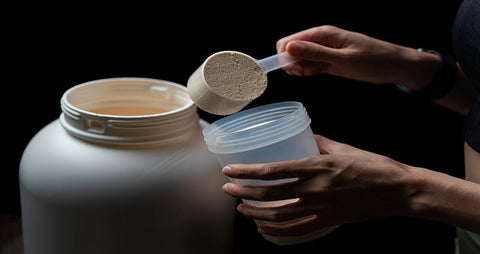Pre-workout supplements you take pre-working out, and post-workout supplements you take post-working out.
But when is the right time to take creatine and protein?
Unlike acute fast-acting ergogenic aids, such as nitric oxide (N.O.) boosters and beta-alanine and caffeine, etc., etc., creatine and protein deliver their benefits gradually, meaning that you have to continually supplement them until their benefits accumulate over time.
Many athletes and exercisers believe that what primarily matters when supplementing creatine or protein is that you simply “get enough” daily, so it doesn’t really matter when you supplement either—only that you are getting enough of each on a daily basis.
Others, by default, believe the best time to supplement creatine is before exercise to enjoy any potential acute energy-boosting effects of the compound. The same people might argue that supplementing protein immediately after exercise mitigates post-workout muscle soreness and kickstarts anabolic muscle recovery and growth.
Which all makes intuitive sense …but is this really the best way to supplement creatine and protein? What does the clinical research have to say about all this?
In this guide on the “correct whey” (haha) to timing your creatine and protein supplementation, we cover all the best practices on how to take creatine and protein, as well as a breakdown on the best creatine and protein supplements to stack together.
But before diving into all of that, let’s first address the basics: what are creatine and protein and what can they do for you?
What are Creatine and Protein?
Typically, when someone is new to exercising and taking workout supplements, the first go-to supplements they buy include a pre-workout, a protein powder, and some source of creatine—whether it’s already present in the pre-workout formula or bought separately.
Newcomers are attracted to these three types of workout supplements because it’s what all the gym veterans seem to be using. And whatever the gym veterans seem to be using seems like a good place to start!
However, as with any supplement, it’s good to know exactly what you’re putting in your body, why you’re putting it in your body, and what exactly it does. While pre-workout formulas may drastically vary from one formula to another, creatine and protein refer to specific nutrients that simultaneously nourish and enhance our muscular performance. Creatine supplements are known for their benefits in increasing muscle mass, improving workout performance, and enhancing muscle recovery.
Protein is essential for muscle growth, repair, and recovery. It is important to consume protein with all essential amino acids, as they are necessary for muscle protein synthesis and optimal muscle support.
Creatine
An organic compound highly concentrated in muscle tissue, creatine is stored and used in muscle to fuel the production of adenosine triphosphate (ATP) energy, the basic energy-carrying unit that powers muscle contractions. Creatine supports energy production and ATP regeneration in muscle cells, which in turn may support strength, power, performance, recovery, and muscle building when combined with regular resistance exercise. 1
Under heightened conditions of muscle activity, such as during exercise, the body rapidly burns through its natural creatine reserves to fuel ATP production, making creatine one of the limiting factors of exercise endurance.
In other words, once your creatine reserves deplete, muscle fatigue and exhaustion kick in, noted by a familiar “burning” sensation in your muscles associated with lactic acid accumulation.
By supplementing creatine and saturating their muscle tissues with excess ATP-fueling creatine, both aerobic and anaerobic exercisers may help enhance the intensity and duration of their workouts for a greater overall boost on one’s muscle mass and strength gains. 2, 3
Protein
Amino acids make proteins. Proteins make muscle fibers. And muscle fibers make us …well, they make us muscly, which is what a lot of us are seeking to be when we hit the gym.
Of course, as everyone knows, simply “hitting the gym” isn’t enough to increase one’s muscle mass and strength. In addition to strength-training, we need to consume additional protein (ideally, containing a comprehensive essential amino acid profile) to fulfill our body’s heightened muscle-building demands. Protein supplementation, especially with essential amino acids, can lead to increased muscle mass.
Whereas creatine concentrates within muscle tissue to fuel ATP production during exercise and competition, protein comprises our muscle tissues, assisting with the post-workout repair and recovery of exercise-damaged muscles to create bigger, stronger muscle mass. 4
For the most part, this means that consuming adequate daily protein, via diet and/or supplementation, is what matters the most. However, research does suggest that the timing of protein ingestion may also matter with regard to muscle protein synthesis. 5
Creatine vs. Protein: Which is Better?
Creatine and protein are, without a doubt, two of the best natural supplements you can take to enhance your exercise performance and results. In fact, they may be the best natural supplements you can take, except for perhaps a few close runners-up (e.g., L-citrulline, beta-alanine) that are also worth considering.
Yet, while both creatine and protein assist with your muscle mass and strength gains, essentially targeting the same training benefits, their differences in structure and function make it so you don’t have to choose between the two. Taking both whey protein and creatine together can maximize muscle growth and recovery, as creatine provides energy for muscle contractions and protein offers building blocks for muscle growth and repair.
Neither creatine nor protein is “better” than the other, though certainly there’s a fun conversation to be had on which is more essential to one’s workout supplement regimen. (You’ll have to have that conversation on your own time, though!)
With that in mind, if you’d like to stack both creatine and protein, there’s no reason not to—unless you have some special conditions that preclude you from supplementing either. Research has found both creatine and protein to be clinically effective at enhancing muscle mass, strength, and some measures of endurance, 6,7 with plenty of evidence to back the safety of combining the two. Taking whey protein and creatine together can also improve muscle strength and power.
Is It Safe to Stack Creatine and Protein?
Yes, it is safe to stack creatine and protein, to put it simply. Taking creatine alongside protein supplements can enhance power during resistance training and aid muscle recovery. Because both increase muscle mass via separate natural mechanisms, taking both at the same time may help comprehensively elevate your anabolic muscle metabolism much further than if you were just to take either creatine or protein.
Research has found that not only is the combination safe but ingesting creatine in combination with protein (and carbohydrates) may help enhance creatine retention, 8 potentially enabling you to efficiently store more of the creatine you supplement.
When Is the Best Time to Take Creatine and Protein?
In one study from 2013 focusing strictly on the effects of creatine before or after workout, a group of researchers observed that “consuming creatine immediately post-workout is superior to pre-workout vis a vis body composition and strength.” 9 Based on these findings alone, it’d seem that it’s best to take (at least) creatine immediately after working out.
However, in a separate study observing the combined effects of creatine + protein + carbohydrate supplementation, it was found that taking this stack simply closer to exercise (whether immediately before or immediately after) is superior to taking this stack long before (e.g., in the morning) or long after (e.g., in the evening) exercise in terms of increasing one’s lean body mass and 1-RM strength. 10
At the least, the best time to take creatine and protein is close to working out. However, because you're likely to take your protein shake immediately after exercise, which for many is the ideal time to supplement protein, post-workout creatine + protein may be the best way to go.
Dosage Notes
While the Recommended Daily Allowance (RDA) for protein is 0.8g of protein per kilogram of body weight, it’s typically expected for you to consume more while strength-training, especially if you’re looking to increase your muscle mass. Yet, even so, it’s not recommended to take too much all at once, as this may disrupt the proper digestion of your protein serving.
With that in mind, here are the typical serving size amounts recommended for protein and creatine:
- 20g Protein per Serving
- 3-5g Creatine per Serving
Of course, it’s possible to distribute those dosage amounts into multiple sub-servings, to be taken at different times of the day for maximum nutrient absorption. However, if you’re looking to time your creatine and protein intake appropriately, taking 20g protein and 3-5g creatine together may work best for maximizing these supplements’ anabolic benefits.
What Are the Best Creatine and Protein Supplements?
When it comes to choosing the right creatine and protein supplements, the key is quality and timing. There’s no doubt about it, both creatine and protein play essential roles in muscle performance, energy production, and recovery.
But what about your pre-workout?
While creatine and protein are critical to maximizing muscle gains and recovery, the right pre-workout can prime your body to make the most out of both. Enter Pre Lab Pro®—the perfect pre-workout to complement your creatine and protein regimen.
Why Pre Lab Pro® is the Best Pre-Workout to Complement Creatine and Protein
Pre Lab Pro® isn’t just another pre-workout loaded with stimulants. Instead, it’s carefully designed to enhance blood flow, endurance, and focus—giving you everything you need to power through tough training sessions without the overload of extra creatine.

Unlike many pre-workouts that throw in creatine as a one-size-fits-all solution, Pre Lab Pro® leaves out creatine on purpose.
This gives you more control over how much creatine you take, letting you time it perfectly to meet your training goals.
Plus, by stacking Pre Lab Pro® with your chosen creatine supplement, you get the best of both worlds: enhanced energy and performance from Pre Lab Pro® and muscle power and recovery from your creatine.
What’s more, the nitric oxide-boosting ingredients in Pre Lab Pro®—like L-Citrulline (Kyowa Quality®) and Red Beet Powder—increase blood flow, helping to deliver creatine and protein to your muscles more effectively. This ensures that your muscles get the nutrients they need when they need them most, enhancing both your strength and recovery.
The Bottom Line
Creatine and protein are arguably the two best natural supplements for enhancing muscle growth and strength, making them essential for any athlete—whether you’re a bodybuilder, long-distance runner, or anything in between. Stacking creatine and protein together offers a comprehensive boost to your muscle metabolism and overall performance, ensuring your body gets the support it needs for both energy and recovery.
While creatine and protein are critical post-workout, Pre Lab Pro® is the perfect pre-workout companion to prime your muscles for action. It enhances blood flow, endurance, and nutrient delivery, helping you get the most from your creatine and protein when it counts. With ingredients like L-Citrulline (Kyowa Quality®) and Red Beet Powder, Pre Lab Pro® boosts nitric oxide (NO) production, ensuring that your muscles receive a steady flow of oxygen and nutrients, improving performance during training and recovery afterward.
By stacking Pre Lab Pro® with your chosen creatine and protein supplements, you’re setting yourself up for better, more consistent muscle gains and optimal workout performance—all without the creatine overload found in many other pre-workouts.















